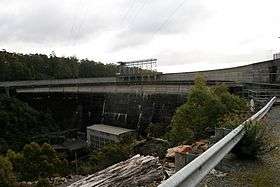Butlers Gorge Power Station
| Clark Dam | |
|---|---|
|
The Clark Dam wall with the Butler Gorge Power Station located at the wall base. | |
 Location of the Clark Dam in Tasmania | |
| Country | Australia |
| Location | Central Highlands, Tasmania |
| Coordinates | 42°15′36″S 146°15′36″E / 42.26000°S 146.26000°ECoordinates: 42°15′36″S 146°15′36″E / 42.26000°S 146.26000°E |
| Purpose | Power |
| Status | Operational |
| Opening date | 1949 |
| Owner(s) | Hydro Tasmania |
| Dam and spillways | |
| Type of dam | Arch dam |
| Impounds | Upper River Derwent |
| Height | 67 metres (220 ft) |
| Length | 378 metres (1,240 ft) |
| Dam volume | 159 thousand cubic metres (5.6×106 cu ft) |
| Spillways | 1 |
| Spillway type | Controlled |
| Spillway capacity | 687 cubic metres per second (24,300 cu ft/s) |
| Reservoir | |
| Creates | Lake King William |
| Total capacity | 539,340 megalitres (19,047×106 cu ft) |
| Catchment area | 575 square kilometres (222 sq mi) |
| Surface area | 41.45 hectares (102.4 acres) |
| Power station | |
| Name | Butlers Gorge Power Station |
| Coordinates | 42°15′36″S 146°15′36″E / 42.26000°S 146.26000°E |
| Operator(s) | Hydro Tasmania |
| Commission date | 1951 |
| Type | Conventional |
| Hydraulic head | 49 metres (161 ft) |
| Turbines |
1 x 12.20-megawatt (16,360 hp) English Electric Francis-type turbine |
| Installed capacity | 12.2 megawatts (16,400 hp) |
| Capacity factor | 0.8 |
| Annual generation | 684 gigawatt-hours (2,460 TJ) |
|
Website hydro | |
| [1] | |
The Butlers Gorge Power Station is a conventional hydroelectric power station located in the Central Highlands region of Tasmania, Australia.
Technical details
Part of the Derwent scheme that comprises eleven hydroelectric power stations, the Butlers Gorge Power Station is the first station in the scheme. The power station is located aboveground at the foot of the concrete arched Clark Dam across the River Derwent that forms Lake King William. Water from the lake is fed to the power station, coupled to one of two discharge regulating valves to ensure water flow to Tarraleah Power Station located further downstream.[2][3]
The power station was commissioned in 1951 by the Hydro Electric Corporation (TAS) and officially opened on 22 November 1952. The station has one English Electric Francis turbine, with a generating capacity of 12.2 megawatts (16,400 hp) of electricity. The station building houses a single alternator and the turbine has a fully embedded spiral casing with water flow controlled via a butterfly type valve. It also houses a 125 kVA diesel generator for alternate station services supply when needed. The station output, estimated to be 684 gigawatt-hours (2,460 TJ) annually,[1] is fed to TasNetworks' transmission grid via an 11 kV/110 kV three-phase English Electric generator transformer to the outdoor switchyard.[2]
The water discharged from the Butlers Gorge Power Station flows via three conduits to either Nieterana mini-hydro, Tarraleah Power Station, or to Wally’s Weir and back into the Derwent.[3]
See also
References
- 1 2 "Register of Large Dams in Australia" (Excel (requires download)). Dams information. Australian National Committee on Large Dams. 2010. Retrieved 23 June 2015.
- 1 2 "Butlers Gorge Power Station: Technical fact sheet" (PDF). Derwent Catchment. Hydro Tasmania. Retrieved 4 July 2015.
- 1 2 "Derwent: Butlers Gorge Power Station". Energy. Hydro Tasmania. Retrieved 4 July 2015.
